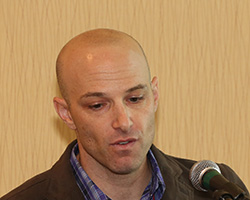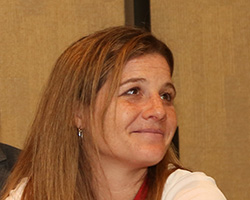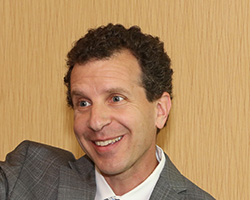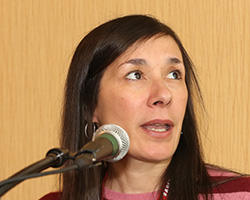Integrating Research and Clinical Practice
The current system for training clinical psychologists emphasizes a scientist–practitioner model, in which clinicians take best practices from the research world and integrate them into patient treatment. Although ideal in theory, the reality of clinical training and practice is a large gap between research and clinical components.
Clinicians realize the integration needs to improve. This thinking led a group of researchers and practitioners to band together to form the Delaware Project, with the aims of redefining clinical science training and improving intervention design and implementation.
This year’s Clinical Science Forum symposium, “Programs of Excellence and the Delaware Project on Clinical Science Training,” featuring David A. Sbarra (University of Arizona), Julie A. Schumacher (University of Mississippi Medical Center), Steve Martino (Yale University), and APS Fellow Joanne Davila (Stony Brook University), highlighted the speakers’ experiences implementing innovative training programs designed to integrate research-based and clinical practices.
Fidelity — the technical adherence and competence with which a treatment is delivered — matters a great deal for evaluating the internal validity of research and for patient outcomes, Sbarra said. Unfortunately, he believes “many empirically supported treatments are not being delivered with high fidelity in the community as they are practiced.”
To maximize students’ exposure to core evidence-based behavioral treatments and to ensure fidelity to these techniques, he turned to a practice more commonly seen in the medical community — simulated case studies. Doctoral students were given simulated written cases and were asked a series of formulation questions. These questions encouraged students to think about the type of additional information they might need about their patient and how they might proceed with treatment. The students then participated in, and received feedback on, behavioral simulations of treatment sessions with actors trained to display the symptoms described in the case presentations.
The vast majority of students reported that the case studies were helpful, and observer ratings of students’ work showed increasing levels of fidelity over the course of the semester, Sbarra said.
Schumacher’s interest in clinical training techniques began in a similar way to Sbarra’s. She noted that one of the main ways clinicians gain exposure to evidence-based practices is through research-oriented doctoral training programs; however, many graduates from these types of programs go into academia and actually treat few patients. Her team was interested in bridging the gap between research-oriented programs and full-time clinicians who may not have had this type of intensive research-based training.
To accomplish this goal, she created a program that trained psychology residents and postdoctoral fellows to effectively practice and disseminate motivational interviewing (MI) techniques to community-based substance abuse treatment programs. The residents and fellows who participated in the program were first given didactic training in MI, followed by supervised practicum training. Students then received didactic training in MI dissemination and completed a practicum in MI dissemination to community providers.
Residents and fellows were, over the course of the program, able to effectively train 95 community providers in MI techniques. Although the program was successful, Schumacher indicated that she and her collaborators are still tweaking their techniques to see if they can improve training methods. They hope to continue testing and improving their techniques — this time with a training program centered on exposure therapy for post-traumatic stress disorder.
Martino noted that many of his residents, interns, and fellows knew the benefit of evidence-based treatments, but “while they could give lip-service to the treatments, their ability to fully enact them with sophistication in various clinical circumstances was lacking.”
Martino implemented a voluntary set of workshops coupled with voluntary supervision on a variety of evidence-based treatment approaches with the goal of getting people to a level of general competence. Although along the way he encountered several challenges — such as difficulty scheduling workshops and finding patients for whom these treatments would be appropriate — he found that people who participated generally reached their criterion level of competence within three sessions.
Although the clinical program at Stony Brook University already places an emphasis on the integration of science and practice, Joanne Davila wanted to formalize this approach. So she and her colleague, APS Fellow Greg Hajcak Proudfit, created an in-house clinic for anxiety treatment that was used as an avenue for training students in evidence-based practices.
“The entire program was centered on bringing together experiences in the classroom, the lab, and the clinic,” Davila said at the symposium.
Students took lessons on basic science and then applied that knowledge directly to training and assessment, case conceptualization, and treatment, she said. Clinical faculty provided all the training and supervision within the program, which provided a link between research-based knowledge and the application of clinical treatment techniques. Davila noted that the project seemed to be a success in that students were able to deliver evidence-based interventions to patients within the clinic and effectively supervise others in providing those treatments.
Although these types of highly integrative training programs may be in the early stages of implementation, recognition of their importance is already gaining ground. This rising interest in revising clinical training techniques is exemplified by the appearance of an article discussing the history and main goals of the Delaware Project in the top five most-cited articles of APS’s journal Clinical Psychological Science. The late Varda Shoham, a member of the APS Board of Directors and cofounder of the Delaware Project, was lead author of that article.
Although each of these innovative training methods is different, they all share the goal of integrating research-based treatments into clinical science practices — a main objective of the Delaware Project.








APS regularly opens certain online articles for discussion on our website. Effective February 2021, you must be a logged-in APS member to post comments. By posting a comment, you agree to our Community Guidelines and the display of your profile information, including your name and affiliation. Any opinions, findings, conclusions, or recommendations present in article comments are those of the writers and do not necessarily reflect the views of APS or the article’s author. For more information, please see our Community Guidelines.
Please login with your APS account to comment.